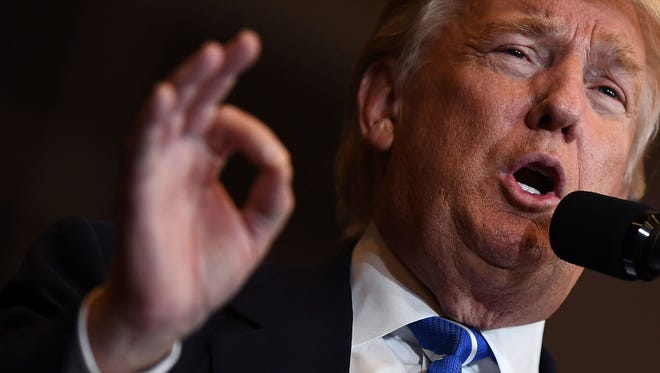Wolff: Why we embrace Trump as a 'businessman'

What is it with this idea of the “businessman?”
Important parts of the Republican base failed to warm to Mitt Romney in part because he was a 1% businessman and financier — an extremely successful one. But big parts of that same base now rationalize their support of Donald Trump because he is such a good businessman.
In fact, Romney, a former governor of Massachusetts, largely tried to play down his wealth and business credentials and suffered on all the occasions when indications of his great success slipped through. Trump, on the other hand, is running entirely on his standing as a businessman and on the flashiness of his wealth — taking every opportunity to exaggerate the size of his fortune rather than downplaying it.
The business community — the country’s leading CEOs, bankers and investors — pretty solid in its admiration of Romney, is even more unified in its horror of Trump. Among the CEOs of top Fortune 100 companies, not a one, The Wall Street Journal reports, has contributed to the Trump campaign. Their beef is that his policies, such as he has policies, will wreck the economy; his off-the-cuff cowboy approach hardly represents businessmen in a business-like light; and, to boot, much evidence suggests he is not a good businessman at all.
Wolff: Abnormal Trump catches up to normal Clinton
Indeed, many people believe that this rich kid would be far wealthier today if he had merely put his inheritance from his father in the bank; managing it on his own has not yielded what simple compounded interest would. Then there are his business' multiple bankruptcies. And there’s the rather astounding trail of litigation that has followed him, his forte being not wealth creation but conflict. And there is, of course, the nature of his business too — not business but show business. He has not really sold real estate, rather he has just sold his name on real estate. He is not a developer, he is a promoter, hence quite a charlatan in the view of many who actually develop and finance buildings.
Arguably, all of the worst traits that are ascribed to classic businessmen like Romney and to the general image of Wall Street — dishonesty, lack of transparency, exploitation of the working man, making aggressive use of loopholes in the system, not creating real value just churning money — pertain much more obviously to Trump than to others.
So how is it that he’s convinced so many people that he’s the ultimate example of a businessman, that deal-making is his ne plus ultra skill, and that if government were run by a businessman like him — as opposed to, say, a businessman like Romney — the broken democratic system would surely be fixed?
Rieder: Tough, fact-based reporting on Trump
Why this businessman as opposed to all the others?
In part, it’s about the word "businessman." Mitt Romney’s world of businessmen is a closed one, quite a secret and technical society, accessible to few, and almost never the populist hoi polloi. Few can imagine themselves being Mitt Romney — few would want to be. His is the world of the elites. This is not ordinary business, not small business, not real cash register business, but abstract business. This is the system.
Trump casinos and golf courses and name in chrome are a lot less abstract. But his use of the word “businessman” is also different — it’s with a wink. It’s like when a drug dealer says he’s a businessman. This “businessman” is a rogue, a gifted cheater. He’s screwing the system. And he’s having the time of his life. This is one version of the American dream.
There has always been a distinction in American capitalism between the population of workaday businessman, suited up, faceless, bean counters, wholly unloved, and the huckster, who is loved.
We love the huckster because he’s the dramatic figure — vastly more movies are made about hucksters than bean counters — and because he seems to be taking risks and having the payoff. He’s beating the stiffs (Romney) at their own game. He’s a romantic figure.
Wolff: Derailing the Trump train
For Trump, convincing people he actually is a businessman is part of his ultimate hustle. He is only slightly more of a successful businessman than an actor who plays a doctor is a doctor. That is, Donald Trump, not all that successful a businessman, morphed into being a celebrity who posed as a businessman.
It is confounding to many people who actually know businessmen or, perhaps, who even regularly read a business publication, that so many voters are willing to believe he is one. Indeed, the really confounding thing here is not that Trump lies, it’s that people believe him.
Rieder: Trump Foundation scandal needs more attention
But, of course, many of the people who are confounded are the people who might actually be willing and even eager to elect a real businessman, while the people who justify their support of Trump because he is a businessman, would likely never embrace an actual businessman.
Big lie theory surely plays a part here: Say you’re a successful businessman enough and people believe it (that’s the foundation of most business fraud). And tell a good enough story — and the Trump story is pretty good — and people, at least some of them some of the time, won’t pay attention to the details.
But, in the end, it may come down to the deep American ambivalence toward business and businessman, always lurking in the back of our politics. In our populist heart, we don’t like them, in our aspirational head, we envy them. In our very modern stomachs, we rightly fear them. And in our romantic fantasies, if we could actually be a successful businessman, a blowhard with plane and trophy wife, there are, and it really isn’t that surprising, a lot of people who would choose to be Donald Trump.